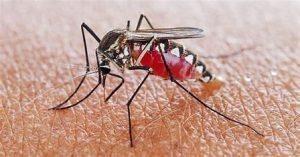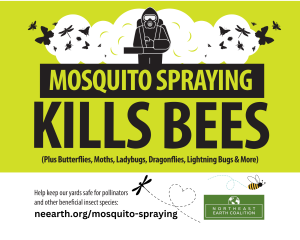By David Wasmuth
May is here! After winter’s long confinement and April’s wild temperature swings, it’s time to enjoy the warming weather. Stretch out on a lawn chair, savor the scents and colors of the blooming flowers, and enjoy the birdsong. But what’s that other sound? That persistent, annoying whine, so close but so hard to pin down? You make your first vain swats of 2022 and think about heading back inside. Just like you, Montclair’s mosquitoes find May the perfect time to shake off the winter blues, emerge from confinement (in their case, in eggs), and get psyched up for those active summer months.
How did they find you? Your mistake was breathing. From 100 feet away, they detect the carbon dioxide you exhale. As they approach, the increasing CO2 concentration lets them zero in on the blood meal you offer while your body’s heat and odor guide them over the last few feet. If you’re wearing black or navy blue, you’ve given additional help. Dark colors attract them.
Mosquitoes find some people more appealing than others — 20% of us are said to be especially tasty. Blood type may be a factor, but it isn’t clear-cut; some mosquito species favor type O while others prefer type AB. The amount of CO2 one exhales also matters, with larger people exhaling more than smaller ones. Once it bites, the mosquito may take a few minutes to fill up. If interrupted, it will bite again (and again) until it has drunk its fill. You may not notice immediately since the mosquito injects anesthetic saliva as it bites, along with anticoagulant to ensure steady blood flow.
While the anesthetic may seem a small blessing, your body’s reaction to the mosquito saliva causes itching and swelling. Worse, some species’ saliva carries pathogens that have plagued humanity for millennia. Fortunately, Montclair is out of range of the worst of these, such as malaria and dengue, but our evolving climate could change that. If it’s any comfort, you only need to worry about half of the mosquito population. Mosquitoes’ day-to-day nourishment consists of plant nectar. Your blood is only required for females to produce eggs, so males never bite. Besides blood, mosquitoes need water to reproduce. Their eggs only hatch in standing water, where the larvae and pupae live until they emerge as adults. A swamp isn’t required; an inch of water in a saucer will do the trick, so less standing water means fewer mosquitoes.
Check your yard frequently to make sure plant saucers are empty and no water is standing on plastic tarps. Bird baths need changing at least every two to three days, and gutters should be maintained and checked regularly for blockages. An intriguing new invention in the battle with mosquitoes is the Bti dunk tablet. Available at most hardware stores, dunk tablets contain a targeted virus that infects only mosquito larvae. Left in a standing water source such as a backyard water feature, one dunk tablet wipes out mosquito larvae for a month. Entomologist Doug Tallamy has an ingenious formula for mosquito control. Filling a bucket with water and tossing in some straw creates an irresistible spot for mosquitoes to lay eggs, as the females are attracted to the fermenting straw. But there is a secret ingredient: a dunk tablet. They keep laying eggs in the bucket, but the larvae won’t survive to adulthood.
Two popular mosquito control approaches are not only ineffective but appallingly destructive and likely counterproductive. The first is the electric bug zapper. The sound of insects sizzling in the zapper may feel satisfying if you imagine they are all mosquitoes, but only 1% of the insects killed are mosquitoes or other biting insects. The other 99% are benign or beneficial insects – moths, lightning bugs, even insects that prey on mosquitoes, such as dragonflies. Even more disastrous is mosquito fogging, a practice heavily promoted throughout Montclair in signs, billboards and weekly flyers in the mail. Mosquito fogging involves letting a company with a cute macho name spray your yard with pyrethroids, a toxin described as “organic” but fatal to virtually all insects, from bees to butterflies to moths to ladybugs to lightning bugs.
It doesn’t affect birds directly but wipes out their most important breeding season food sources, likely dooming many of their newborns to starvation. And mosquitoes? Any mosquito hanging out in your yard during fogging will probably die. But mosquitoes can travel up to three miles and reproduce faster than most of those other insects, so, following your C02, they will promptly return to plague you. Your new mosquito colonists will even owe you thanks for killing off the birds and predator insects that normally eat them. And the repeated massacres of your beneficial insects — repeated because the mosquitoes will keep coming back — will cost you around $700 a season.
So, you’ve emptied your plant saucers, changed your bird baths, unblocked your gutters, and dropped a dunk tablet in your backyard pond. Still, someone somewhere in your neighborhood was a little less diligent, so again you hear that whine. What’s left to do? Repellents, DEET being most effective, can keep mosquitoes off, although the smell and feel can be unpleasant and some people have concerns about toxicity. Hooking up an electric fan in your outdoor seating space is a simple, safe, and effective alternative; mosquitoes are weak flyers, so even a light breeze will keep them away. That cutting-edge 19th-century technology, the screened-in porch, still works in 2022, as does a backyard canopy with mosquito netting. Your summer wardrobe also counts — wear light colors and cover as much skin as you comfortably can. Feet and ankles are usually mosquitoes’ favorite targets, so they should have priority.
Or, you could try holding your breath.

STOP MOSQUITO SPRAYING! ORDER YOUR SIGN HERE, $20 each: ![]()
RESOURCES:
SPRING INTO ACTIONS AGAINST MOSQUITOES
